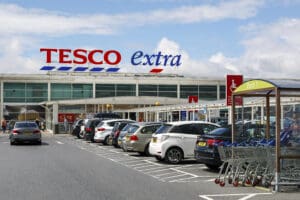Tesco has warned that its profits are likely to fall this year as Britain’s biggest supermarket battles growing competition and rising costs in an increasingly aggressive grocery market.
Announcing its full-year results, the FTSE 100 retailer said it had seen a “further increase in the competitive intensity” of the UK grocery sector and expects adjusted operating profit to fall to between £2.7 billion and £3 billion in the year ahead — down from £3.1 billion in the year to 22 February.
The outlook reflects mounting pressure on the industry, as rivals cut prices to gain market share. Last month, Asda reignited a supermarket price war, pledging heavy investment in lower prices as part of its turnaround strategy — a move that sent shockwaves through the sector and briefly wiped billions off the market value of major supermarket groups including Tesco, Sainsbury’s and Marks & Spencer.
While the UK’s largest grocer has so far weathered the storm, thanks in part to its scale, supplier relationships and the strength of its Clubcard loyalty scheme, it acknowledged that it must remain flexible to maintain its lead.
“Our continued focus on value and quality, coupled with market-leading availability, has contributed to another year of increased customer satisfaction and our highest market share for nearly a decade,” said chief executive Ken Murphy.
Tesco’s market share rose to 27.9% in the 12 weeks to 23 March, up from 27.3% a year earlier, according to the latest data from Kantar.
Group revenue, excluding VAT but including fuel, rose 2.5% to £69.9 billion, in line with analyst expectations. Adjusted operating profit increased 10.6% year-on-year, also matching consensus forecasts.
However, Tesco warned that wage inflation and rising operational costs — especially from changes to National Insurance and the national living wage — will weigh heavily on the year ahead. The retailer, which employs 330,000 people, said it will face an additional £235 million a year in National Insurance contributions, even before the full impact of the minimum wage increases is factored in.
Despite the cautious outlook, Tesco remains committed to shareholder returns, announcing a new £1.45 billion share buyback to be completed by April 2026.
Murphy added: “Building on our strong financial performance, robust balance sheet and positive momentum, we are setting ourselves up for the year ahead with the flexibility to continue to win in a highly competitive market.”
Tesco has sought to protect its margins by balancing premium ranges with discount lines, and by continuing to price match Aldi and Lidl. The company also owns Booker, the grocery wholesaler, and operates stores in eastern Europe and the Republic of Ireland, providing it with some geographic diversification.
Despite the strong underlying performance, Tesco shares fell 4% to 321p in early trading, as investors reacted to the more cautious profit guidance.
With inflationary pressures persisting and competition only intensifying, the supermarket sector is entering a period of significant turbulence — and Tesco’s latest results show even market leaders are not immune.
Read more:
Tesco warns that supermarket price war will eat into profits

